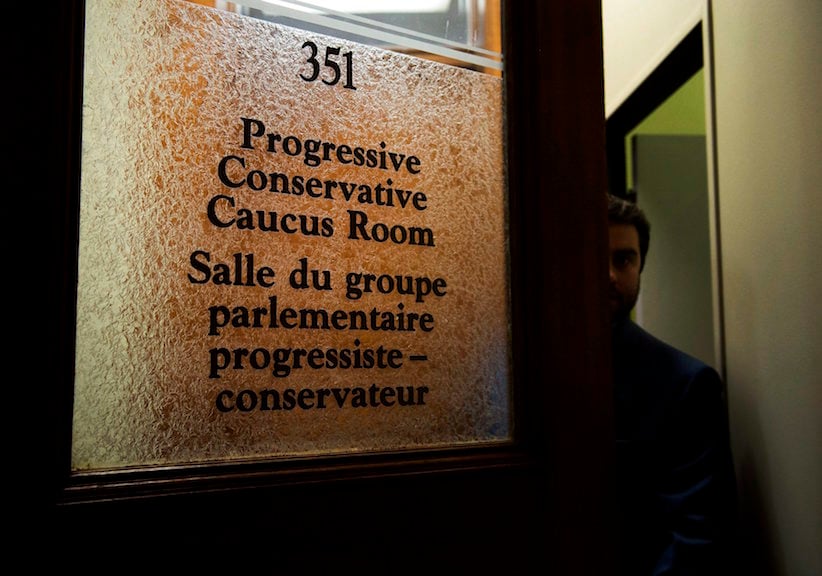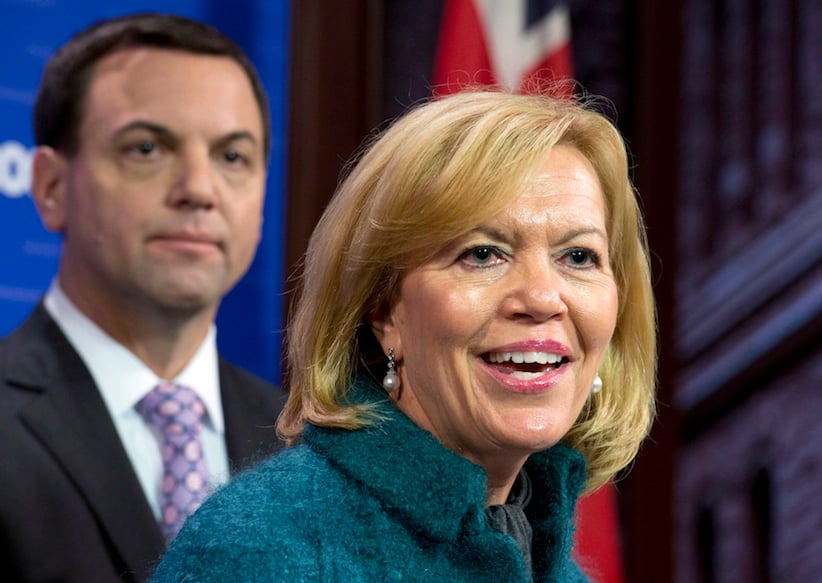The Ontario PC Party needs a woman to take charge
Opinion: Amid backroom turmoil and sexual misconduct allegations in Ontario’s official opposition, here’s the case for a female Ontario PC leader
PC staff member leaves the room caucus room at Queen’s Park in Toronto on Friday, January 26, 2018. Ontario Tories will huddle today to pick an interim leader who may lead them into the June provincial election, following Patrick Brown’s resignation early yesterday morning in the face of sexual misconduct allegations, the party isn’t even sure if it will hold a leadership race before the vote. THE CANADIAN PRESS/Nathan Denette
Share

It could once be fairly said that the sign of a struggling political party was a woman at the helm.
From former prime minister Kim Campbell, to Christy Clark, Alison Redford and Kathleen Wynne, most of this generation of female leaders can tell a similar tale of gamely stepping up to lead stale, scandal-ridden or otherwise flagging political parties.
As more women succeed in politics, this maxim will falter—but on the whole it still tends to be true. We are not quite far along enough in history to cease seeing female leaders as a novelty, and so they still seem to provide a gloss of modernity and progressivism that often wins at first, but wears to a thin matte once they’re in government.
The future leader of the Ontario Progressive Conservatives may prove the rule again. Aloft in the polls and well-placed to defeat Wynne’s Liberal government on or before the next election on June 7, the Ontario PCs’ most pressing problem seems to be the private member of former leader Patrick Brown.
The off-putting perpetual bachelor suffered a stunning fall last week when CTV News published two corroborated but anonymous reports alleging Brown got them drunk and then cornered them sexually. One of the reports came from his former staffer.
Finally, the Me Too movement has come to Canadian politics; Brown was one of three male politicians to lose his post last week, and if half the rumours long whispered in such circles are true, the line of waiting sacrifices to the Goddesses of Justice and Reform is still long.
In this climate, the allegations against Brown would have doomed the party come the writ drop. Due process—in as much as there is any such thing for a political leader—was exercised within the party. Brown lost the confidence of his caucus and staff, and he was duly punted.
From a purely tactical position, this was not a terrible outcome: It would have been far worse for the PCs if the scandal broke closer to the election, or if Brown had successfully clung to a tainted thread of power. As it stands, five months is ample time to run a brief leadership race and poll the party’s 200,000 members.
And so the PC caucus has selected finance critic Vic Fedeli to serve as interim leader. Fedeli attempted to hold the post through the election—a move that would treat his role as leader and premier as a fait accompli should the PCs win. But the party’s prospective candidates had none of it, circulating a petition to force the executive committee to go to a leadership race. After a contentious backroom battle, those in favour of a race won—although it remains to be seen for how long, given the exodus of its supporters, including the party’s executive director, Bob Stanley, who was fired on Sunday. And one of the most prominent voices who were for the race ran into a scandal of his own over the weekend: PC party president Rick Dykstra resigned shortly after Maclean’s confronted him with a sexual misconduct allegation.
READ MORE: Who is Vic Fedeli?
Despite the uncertainty, a handful of names have already emerged from the ether as potential candidates, including federal Conservative MP Erin O’Toole, and provincial candidates Caroline Mulroney and Rod Phillips; former Toronto city councillor Doug Ford has confirmed his bid, while Ontario patient ombudsman Christine Elliott, who lost the leadership to Brown in 2015, is also reportedly mulling a decision. Federal Conservative MP Lisa Raitt and Toronto Mayor John Tory have publicly announced that they would not be running.

Given the likelihood that these kinds of allegations will snowball as the PCs devolve into factional infighting, perhaps the party really is best served by a woman at the helm, one who could speak unequivocally on the imbalances of power and sex that still run rampant in politics, and would help restore the party’s reputation in time for the vote.
“Tactically, any man who becomes leader of the party will have to answer certain questions about his own past and be comfortable with a much more detailed reckoning about themselves,” said Ginny Movat, a senior consultant at Crestview Strategy. “The Me Too movement has exposed men in positions of power and shown women to be victims. Having a female leader will mean someone who can immediately empathize better with victims and doesn’t have to answer specifically to her own past.”
Politics—like entertainment or business—attracts ambitious men who seek status in the pursuit of sex. The profession features a high level of talent churn and a burnout culture that ensures a seemingly endless supply of nubile staffers who can be both charmed by power and vulnerable to predation. Add stress, booze, and institutional structures hell-bent on optics at all costs and, well, none of these horror stories seem particularly surprising.
Me Too has changed the calculus. Any man hoping to hold a position of power in 2018 must be utterly confident in his sexual bona fides—perhaps more confident than a man who came up in politics in the past generation has any right to be.
A female leader may be the only answer for a party now wracked by sexual misconduct allegations. This may not be fair, but fair is for children. This is politics.
Further, women have an excellent track record; Pauline Marois, Rachel Notley, Wynne, Clark and Redford all won their first elections for the premiership against men.
A female Ontario PC leader would face a truly unprecedented dynamic: She would run against two other female leaders, Wynne and NDP leader Andrea Horwath. Whether that fact would neutralize the feminine mystique, or make the PC leader’s gender even more important, is unknowable.
READ MORE: Brown’s downfall goes beyond politics
But not everyone in the party is convinced that gender should play such a prominent role in the coming leadership race.
“I think that we have many women in our party and in among the candidates who would be very qualified to be the leader,” said Phillips, the PC candidate for Ajax who, when asked if he was running for the leadership himself, said only that he would see how the process unfolds. “But the first quality is someone who brings integrity to the job, and who can make the argument around improving affordability here in Ontario. I don’t think that’s a gender-based discussion.”
“I think a woman leader would be great, but I also think we have to pick the very best leader we can get—not just any woman leader,” said Robin Martin, the PC candidate for Eglinton-Lawrence. “Leadership races are about picking amongst the candidates who are available and present themselves for the job in this kind of situation. We don’t have the luxury of time. We’ve got to pick someone experienced who can hit the ground running.”
Indeed, prioritizing gender seems anathema to a party membership that is generally skeptical of gender quotas and diversity mandates. But infinitely more pressing for people like Martin than gender is the question of platform. The PCs spent 18 months crafting and then passing hundreds of points in a party platform that was then branded around Patrick Brown and his face. The party constitution requires a drawn-out process that involves the grassroots to build that platform, which means any new leader will have to credibly defend and sell a host of policy positions as-is.
“I would like them to throw their hat in the ring with a statement about what they would do. Personally, I would basically keep the platform, even keep the same team that Patrick had,” Martin said. (Over the weekend, Fideli announced the party would rehire Brown’s chief of staff Alykhan Velshi, who resigned his post after Brown initially refused to quit.)
So the future leader of the Ontario PCs will have to provide exceptional credentials, take control of a party rife with internal divisions to clean up after a disastrous former boss, and sell a set of policies that can no longer be changed.
Actually, this sounds like a job for a woman, if ever there was one.